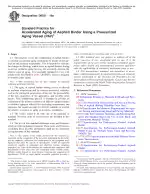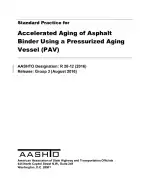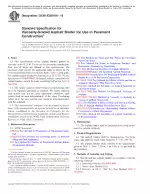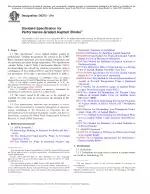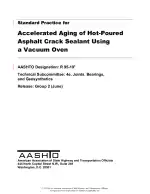ASTM D6521-19a PDF Download
Standard ENStandard Practice for Accelerated Aging of Asphalt Binder Using a Pressurized Aging Vessel (PAV)
Also Known As:
ASTM D6521-19a is a standard practice that outlines a procedure for accelerating the aging of asphalt binders using a Pressurized Aging Vessel (PAV). The purpose of this practice is to simulate the oxidative aging that occurs in asphalt binders during pavement service. By subjecting the binders to pressurized air and elevated temperatures, this practice aims to replicate the changes in rheology that occur in the binders during in-service aging. The residue obtained from this process can then be used to estimate the physical and chemical properties of asphalt binders after several years of in-service aging.
It is important to note that while this practice can simulate the changes in binder rheology, it may not accurately reflect the relative rates of aging. The conditioning process is typically used to determine specification properties of binders in accordance with relevant ASTM specifications or AASHTO M 320. However, it is important to consider that there is no unique correlation between the conditioning time, temperature, and pressure and the in-service pavement age and temperature for different binder grades or sources. Therefore, it is not possible to select a single set of PAV conditioning parameters that accurately predict the properties or relative rankings of binders after specific in-service exposure conditions.
Furthermore, the relative degree of hardening of different asphalt binders can vary based on the conditioning temperatures and pressures in the PAV. Two binders may age similarly at one set of conditions but age differently at another set. Consequently, the relative rates of aging for a set of binders at PAV conditions may significantly differ from the actual in-service rates at lower pavement temperatures and ambient pressures.
It is also worth mentioning that this standard practice is not validated for materials containing particulate materials, and the aging of binders during service is influenced by various factors such as ambient temperature, mixture-associated variables, and properties of the aggregates. Therefore, while this conditioning process evaluates the relative resistance of binders to oxidative aging at selected elevated temperatures and pressures, it cannot account for mixture variables or provide a measure of resistance to aging under in-service conditions.
| Descriptors | elevated temperature, pressure aging vessels, accelerated aging, asphalt binders,Asphalt Mixtures,Aging,Boilers and Pressure Vessels,Pressurized Aging Vessel Test,Temperature,Vacuum Degassing |
| ICS Codes | 75.140 - Waxes, bituminous materials and other petroleum products 91.100.50 - Binders. Sealing materials 93.080.20 - Road construction materials |
| Language(s) | English |
| File Size | 184.3 KB |

